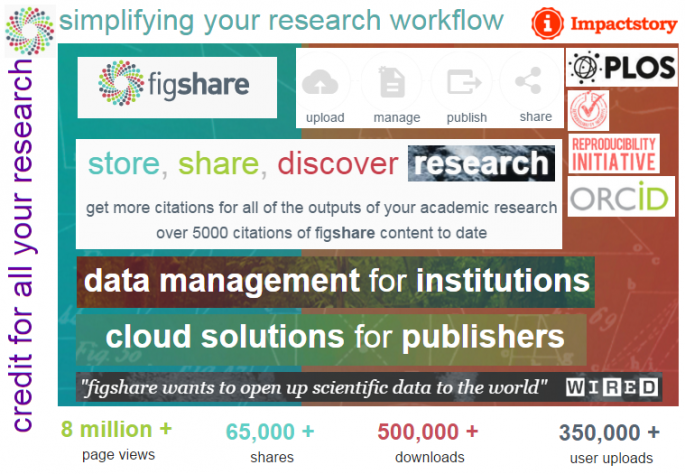Figshare: simplify your research workflow and make it more visible!
14/04/2016

Figshare allows you easily manage all your research outputs and make them available in a citable, shareable and discoverable manner. Just try it!
 “As governments and funders of research see the benefit of open content, the creation of recommendations, mandates and enforcement of mandates are coming thick and fast. figshare has always led the way in enabling academics, publishers and institutions to easily adhere to these principles in the most intuitive and efficient manner” (Mark Hahnel, Founder and CEO, figshare).
“As governments and funders of research see the benefit of open content, the creation of recommendations, mandates and enforcement of mandates are coming thick and fast. figshare has always led the way in enabling academics, publishers and institutions to easily adhere to these principles in the most intuitive and efficient manner” (Mark Hahnel, Founder and CEO, figshare).
Figshare was launched in 2011 by Mark Hahnel as a portfolio company of Digital Science, operated by Macmillan Publishers.
Hahnel - while he was studying for a PhD in stem cell biology – “found that the world of academia was just as cutthroat and political as the corporate world when it came to making a name for yourself and getting credit for the work that you do … The current scholarly publishing model did not allow me to present the research I was doing. I created [Figshare] initially out of purely selfish reasons … that allowed me show, in a super simple way, data sets, and videos to put me ahead of the rest of my peers".

Source: Top 10 Business Intelligence Trends New For 2016
“Figshare is disrupting the status quo, where certain journals and companies can control the publication of papers. This affects the funding of projects and the career of the researcher” (idem; see also: Academics have protested against Elsevier's cost and control of access to journals).
Figshare is a platform where all open data - including null/negative/ inconclusive results data, widely known phenomenon that leads to a significant bias, often referred to as the file drawer effect – will save money and time, speeding up the way new research is discovered.
Figshare is “all about openness, job opportunities, and progressing society. It's all about showing that people are in control of their research and getting credit for it" (Top 10 Business Intelligence Trends New For 2016).
In January 2013 Figshare announced a partnership with PLOS to integrate Figshare data hosting, access, and visualization with their associated PLOS articles
In 2013, Figshare announced integration with Impactstory to support the collection of altmetrics. By adding metrics to the public uploads, and putting the cumulative metrics of a researcher’s uploads, users can trace the true impact of their work. All citations can be exported to Mendeley, Endnote, RefMan, RefWorks, BibTeX, DataCite, NLM, DC, with one click.
In the same year, the Figshare service launched a repository service, which offers institutions a pre-developed infrastructure for hosting academic materials generated by their member communities (see: Figshare for institutions).
.png)
Figshare is not limited to any institution, nor by the normal constraints of publishing: data generated in the lab can be shared and made available to the world as a citable object the same day.

Figshare also hosts the Reproducibility Collection as a founding member of The Reproducibility Initiative, which acts as an independent and blinded validator for replication of submitted data.
Figshare caters for all research domains from all over the world.
| CHEMISTRY | EARTH AND ENVIRONMENTAL SCIENCES | |
| LANGUAGE, COMMUNICATION AND CULTURE | MATHEMATICS | |
| SOCIAL SCIENCE | STUDIES IN HUMAN SOCIETY | |
Research outputs - including figures, massive datasets, media (including video), images, papers (including pre-prints), posters, code and filesets (groups of files) - uploaded in Figshare are publicly available in a citable, shareable, reusable and discoverable manner. Figshare adherences to the principle of Open Research and Open Data; all files are published under a Creative Commons license, CC-BY for most files and CC0: public domain, for datasets.
After you have signed up and logged in, you can upload your files in Figshare and store, preserve (through DOIs, and back up in Portico), manage and search for them in a easy way.

Backup and preservation of Figshare digital objects are mainly supported via a distributed cloud computing network, particularly by the hosting mechanism Amazon S3, with CLOCKSS serving as an additional host for public content.

All of your publicly available Figshare outputs can now be added to your ORCID account, again giving you credit for all of your research.

To sync your ORCID profile, simply log into Figshare, go to the arrow next to your name in the top right hand corner, click 'My profile', 'edit profile' and 'Sync with ORCID'.
By encouraging publishing of figures, charts, data rather than being limited to the traditional entire 'paper' knowledge can be shared more quickly and effectively. Figshare also tracks the download statistics for hosted materials, acting in turn as a source for altmetrics.

“Figshare is useful whether you want to make all of your research outputs available or none. Science would just be a lot more efficient and dynamic if they did” (Figshare: Interview with Mark Hahnel).
Source: FIGSHARE.COM
See also:
The internet was built to share scientific data (Interview with Mark Hahnel, founder of the data sharing platform Figshare)
Sharing Research Data—New figshare For Institutions


